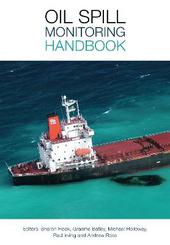
|
Oil Spill Monitoring Handbook
Paperback / softback
Main Details
Description
Oil spills can be difficult to manage, with reporting frequently delayed. Too often, by the time responders arrive at the scene, the slick has moved, dissolved, dispersed or sunk. This Oil Spill Monitoring Handbook provides practical advice on what information is likely required following the accidental release of oil or other petroleum-based products into the marine environment. The book focuses on response phase monitoring for maritime spills, otherwise known as Type I or operational monitoring. Response phase monitoring tries to address the questions - what? where? when? how? how much? - that assist responders to find, track, predict and clean up spills, and to assess their efforts. Oil spills often occur in remote, sensitive and logistically difficult locations, often in adverse weather, and the oil can change character and location over time. An effective response requires robust information provided by monitoring, observation, sampling and science. The Oil Spill Monitoring Handbook completely updates the Australian Maritime Safety Authority's 2003 edition of the same name, taking into account the latest scientific advances in physical, chemical and biological monitoring, many of which have evolved as a consequence of major oil spill disasters in the last decade. It includes sections on the chemical properties of oil, the toxicological impacts of oil exposure, and the impacts of oil exposure on different marine habitats with relevance to Australia and elsewhere. An overview is provided on how monitoring integrates with the oil spill response process, the response organisation, the use of decision-support tools such as net environmental benefit analysis, and some of the most commonly used response technologies. Throughout the text, examples are given of lessons learned from previous oil spill incidents and responses, both local and international. General guidance of spill monitoring approaches and technologies is augmented with in-depth discussion on both response phase and post-response phase monitoring design and delivery. Finally, a set of appendices delivers detailed standard operating procedures for practical observation, sample and data collection. The Oil Spill Monitoring Handbook is essential reading for scientists within the oil industry and environmental and government agencies; individuals with responder roles in industry and government; environmental and ecological monitoring agencies and consultants; and members of the maritime sector in Australia and abroad, including officers in ports, shipping and terminals.
Author Biography
Sharon Hook is a Senior Ecotoxicologist with CSIRO Oceans and Atmosphere, Sydney. Sharon has over 20 years of experience in aquatic ecotoxicology and oceanography. Her research interests include applying modern omics-based approaches to environmental problems, determining the impacts of low-level, long-term toxic responses, and the design and implementation of toxicity testing. She has been involved in the risk assessments following several oil spills, including the Exxon Valdez, the Selendag Ayu spills (both before joining CSIRO) and the Montara well release. She is involved in ongoing projects for BP and Chevron characterizing the Great Australian Bight. Sharon has authored over 60 scientific publications. Graeme Batley is a Chief Research Scientist with the CSIRO Land and Water Flagship and past Director of the Centre for Environmental Contaminants Research based in Sydney. He is one of Australia's leading researchers of trace contaminants in aquatic systems, actively researching this area for over 40 years. He was a lead author of the water and sediment quality guidelines for Australia and New Zealand in 2000 and of the Australian Guidelines for Water Quality Monitoring and Reporting, and has recently led the updating of toxicant guidelines for both waters and sediments. Graeme is author of over 400 scientific publications. Michael Holloway is Environment and Scientific Coordinator for marine oil spill preparedness and response for the Victorian Government. He trained in marine ecology with a quantitative experimental focus, and has worked at the interface between marine science and management for much of his career. His breadth of interests has led to publications on a range of marine topics including invasive species impacts, ecosystem-based management and risk assessment methods, the national policy on aquatic biosecurity and management of environmental monitoring programs in Port Phillip Bay, Victoria. He is currently interested in the application of decision analytic techniques to the complex environmental problems encountered during oil spill response. Paul Irving is Scientific Coordinator at the Australian Maritime Safety Authority, responsible for marine environment protection and maritime spill response science and advice. A diverse 30-year background across many aspects of marine and coastal science, conservation and management, from tropical to Antarctic, provides a unique perspective on Australasian and Pacific marine pollution response. As a firm believer in collaboration and partnership to provide practical solutions, Paul spends much of his considerable energies looking for ways to incorporate new science and research knowledge into spill planning, so that communities (social and ecological) affected by maritime pollution get the effective response they deserve. Andrew Ross is a research scientist with CSIRO. He leads research projects focused on hydrocarbon seeps, the development of new hydrocarbon sensor devices and baseline and oil spill monitoring. He and his team were involved in the Gulf of Mexico MC252 spill response, spending 4 months monitoring surface waters in 2010 and undertaking hydrocarbon seep surveys close to the MC252 incident location in 2011. More recently he has commenced a series of research projects to characterize the baseline hydrocarbon concentrations and geology of the Great Australian Bight. Andrew joined CSIRO in 2004 and has qualifications in marine biology, oceanography and petroleum geoscience.
|